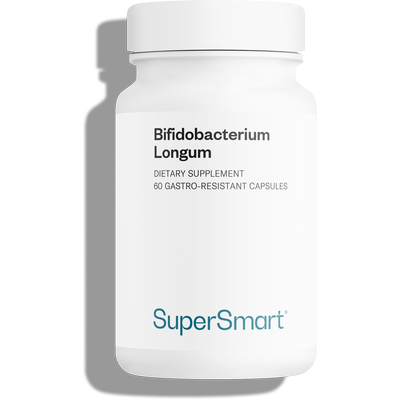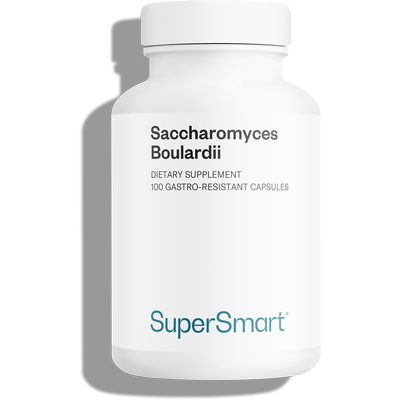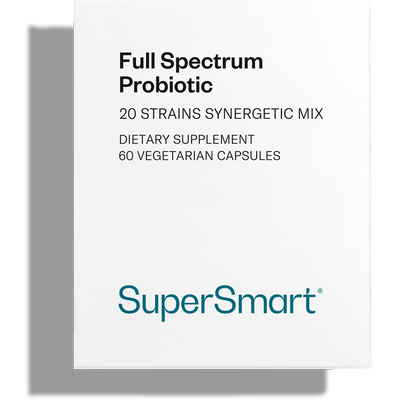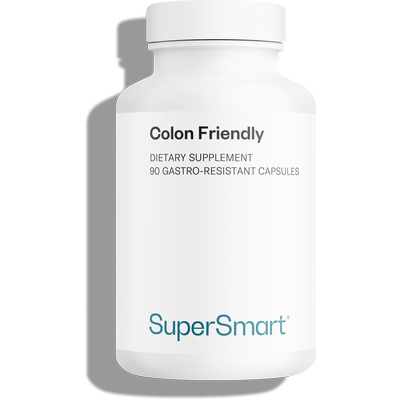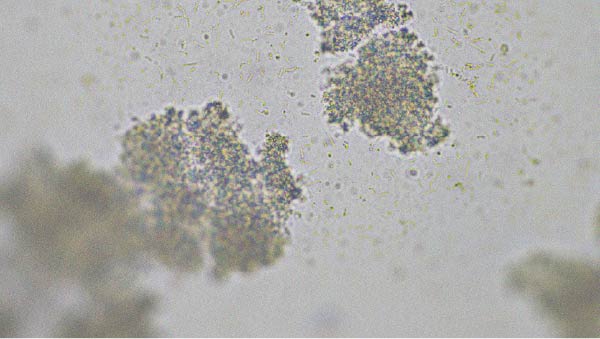Which probiotics should you take for constipation?
Many studies highlight the benefits of probiotics for helping to prevent or reduce constipation. But which particular probiotics should you choose?

Constipation and imbalance of the gut microbiota: a vicious circle?
When the microbiota becomes dysbiotic
Studied in detail for many years for its impact on general health and multiple diseases, the gut microbiota is one of the body’s key organs.
Composed of trillions of bacteria and as individually unique as a fingerprint, the microbiota is formed at a very early stage of development, from the first months of life, in order to achieve a symbiotic balance (1).
Problems arise when this balance is lost - when levels of certain bacteria become too low, and others too high. When such changes to the microbiota are the cause of digestive and extra-digestive diseases, it is referred to as dysbiosis.
Definition of constipation
Constipation is a gastrointestinal disorder characterised by difficulty passing stools, less frequent bowel movements or a feeling of incomplete emptying of the bowels. It can be due to a lack of fibre, fluid, physical activity, etc.
It is often accompanied by increased production of gas or bloating, caused in particular by a rise in bacterial fermentation.
To qualify as ‘chronic’, constipation must generally be present for several months.
Dysbiosis and chronic constipation may well influence each other
Unsurprisingly, studies have shown that sufferers of chronic constipation often present with dysbiosis, ie, an imbalanced gut microbiota (2). But it’s hard to know which comes first!
Current scientific knowledge suggests the two have a mutually influencing effect, creating a cycle in which:
- the dysbiosis aggravates the constipation (the imbalance in the microbiota affects intestinal motility or the absorption of nutrients);
- and the constipation aggravates the dysbiosis (the constipation slows down intestinal transit which can alter the intestinal environment and composition of its microbiota).
Probiotics and the microbiota
According to the World Health Organization (WHO), the term probiotics denotes dietary supplements that contain “live microorganisms which confer a health benefit on the host when consumed in adequate amounts” (3).
In fact, probiotics are composed of the same bacteria as those present in the microbiota. They are used for supporting the balance of the gut microbiota (4).
That’s why many studies have focused on evaluating the efficacy of probiotics, and certain strains in particular, in treating chronic constipation.
Which are the best probiotics for constipation and bloating?
Significant interest in Bifidobacterium longum
A 2017 meta-analysis, reviewing 9 randomised, placebo-controlled trials, suggests that probiotic administration significantly relieves constipation and bloating in older individuals (10%-40% of cases compared with control groups given a placebo).
The bacterial species most often tested was Bifidobacterium longum (which can be found in the supplement Bifidobacterium longum as well as in the formulation Colon Friendly where it is combined with other synergistic bacteria) (5).
Potential benefits of Bifidobacterium lactis for constipation
Another meta-analysis, conducted in 2010, which examined 5 randomised, placebo-controlled trials involving almost 400 patients, highlights other probiotic species (6):
- for constipation in adults, the data suggest positive effects on bowel movement frequency and stool consistency from supplementation with Bifidobacterium lactis, Lactobacillus casei Shirota and Escherichia coliNissle 1917. You can find Bifidobacterium lactis combined synergistically with other ‘friendly bacteria’ in certain probiotic formulations (such as Probio Forte);
- for constipation in children, casei rhamnosus has shown beneficial effects.
A note on studies into constipation relief and probiotics
Caution should be exercised, however, when interpreting these reports because of the diverse nature of the studies, populations and risk of bias. All the researchers confirm the need for further placebo-controlled trials in order to identify strains, doses and optimal supplementation duration. Ultimately, however, most of the studies agree on the potential benefits of probiotics for constipation.
Probiotics for irritable bowel syndrome, in which constipation and diarrhoea can co-exist
Reminder about irritable bowel syndrome (IBS)
It’s also worth mentioning irritable bowel syndrome, which can cause constipation, diarrhoea or a combination of the two. This condition (which seems to be becoming increasingly prevalent over time, particularly among Western populations) has been a key interest in medicine for some time.
Multi-strain probiotics have the edge
A meta-analysis from 2015, examining 15 clinical trials involving almost 1800 patients, points to beneficial effects from probiotics for this condition. It concludes that, compared with a placebo, probiotics reduce pain and symptom severity in IBS (7).
Another meta-analysis found that it was high-concentration multi-strain probiotics in particular, (such as Full Spectrum Probiotic Formula, which contains 20 strains powerfully-dosed at 36 billion CFU per day) which, by modulating the gut microbiota, may be effective in cases of IBS (8).
The yeast Saccharomyces boulardii and IBS
A meta-analysis from 2010 of 31 randomised, placebo-controlled trials involving over 5000 patients suggests that the yeast Saccharomyces boulardiioffers therapeutic efficacy in preventing diarrhoea induced by antibiotics, as well as significant potential in treating IBS in general (and thus its associated symptoms such as constipation) (9).
This probiotic is also available in dietary supplement form (see Saccharomyces Boulardii).
SUPERSMART ADVICE
References
- CARDING, Simon, VERBEKE, Kristin, VIPOND, Daniel T., et al. Dysbiosis of the gut microbiota in disease. Microbial ecology in health and disease, 2015, vol. 26, no 1, p. 26191.
- OHKUSA, Toshifumi, KOIDO, Shigeo, NISHIKAWA, Yuriko, et al. Gut microbiota and chronic constipation: a review and update. Frontiers in medicine, 2019, vol. 6, p. 19.
- MORELLI, Lorenzo et CAPURSO, Lucio. FAO/WHO guidelines on probiotics: 10 years later. Journal of clinical gastroenterology, 2012, vol. 46, p. S1-S2.
- BUTEL, M.-J. Probiotics, gut microbiota and health. Médecine et maladies infectieuses, 2014, vol. 44, no 1, p. 1-8.
- MARTÍNEZ-MARTÍNEZ, Maria Isabel, CALABUIG-TOLSÁ, Raquel, et CAULI, Omar. The effect of probiotics as a treatment for constipation in elderly people: a systematic review. Archives of Gerontology and Geriatrics, 2017, vol. 71, p. 142-149.
- CHMIELEWSKA, Anna et SZAJEWSKA, Hania. Systematic review of randomised controlled trials: probiotics for functional constipation. World journal of gastroenterology: WJG, 2010, vol. 16, no 1, p. 69.
- DIDARI, Tina, MOZAFFARI, Shilan, NIKFAR, Shekoufeh, et al. Effectiveness of probiotics in irritable bowel syndrome: Updated systematic review with meta-analysis. World journal of gastroenterology: WJG, 2015, vol. 21, no 10, p. 3072.
- BRANDT, Lawrence J., CHEY, William D., FOXX-ORENSTEIN, Amy E., et al. American college of gastroenterology task force on irritable bowel syndrome. Am J Gastroenterol, 2009, vol. 104, no Suppl 1, p. S1-S35.
- MCFARLAND, Lynne V. Systematic review and meta-analysis of Saccharomyces boulardii in adult patients. World journal of gastroenterology: WJG, 2010, vol. 16, no 18, p. 2202.
2 Days
very good expereince
very good expereince
Jelena Đaković
2 Days
Very good products.
Very good products.
Agnes BENDSAK
4 Days
Just OK
Just OK, ordering from company for many years and being safisfied
Lynn Mae
5 Days
Recomendo
Produtos encomendados são recebidos atempadamente e de acordo com o anunciado! Muito satisfeita!
Carla Sofia
6 Days
Everything is great!
Everything is great!
Jonas
11 Days
The delivery was fast and the product…
The delivery was fast and the product is great
SOMMARIVA Gianni
12 Days
Great service and lots of information
Great service and lots of information
Gabi
15 Days
Service Satisfaction
I’m satisfied with the service; it fulfilled what it set out to do.
Anfhony Abreu
18 Days
Original product and fast delivery
Original product and fast delivery. I haven't started it yet, but will do soon.
Vincenza Catania
20 Days
Good quality
Good quality. Good service.
Leonel Guzman
22 Days
Top!!!!!!!!
Top!!!!!!!!
Michael
24 Days
Excellent!
Products are great and delivered fast!
PARDINI Debora
25 Days
From order to receive the product
From order to receive the product, the process is smooth & fast. It’s good to customers.
WONG Mei Ling
26 Days
Fast delivery
very quick delivery to italy. product is good.
Customer
27 Days
Prompt delivry !!👍
Prompt delivry !!👍
SWEET Christine
of experience
your money back
##montant## purchase


